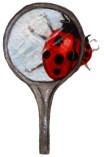![]()
Science
Science is a broad and exciting subject especially for children, who are naturally curious and have questioning minds. It is therefore important that a wide range of experiences is introduced to children in the early years so that they can begin to develop their scientific knowledge.
Inquisitive children can easily be encouraged to find things out for themselves by making observations, carrying out simple experiments and sharing their discoveries. It is also easy to extend activities and introduce ways of recording their findings.
Below are links to themed pages of activities for young scientists.
| Water | Wind |
| Food and Drink | Sight and Sound |
| Magnets | Colours |

Collections of interesting objects
 Children love to look at and touch interesting objects. By
displaying simple collections they can start to make comparisons,
sort objects into similar groups and develop their communication
skills through discussion.
Children love to look at and touch interesting objects. By
displaying simple collections they can start to make comparisons,
sort objects into similar groups and develop their communication
skills through discussion.
Safety is obviously important when handling certain objects and so adult supervision should be planned.
Suggested collections
Leaves |
Buttons |

Learning basic skills and making simple recordings
By introducing the use of new equipment such as scales, magnets, hand lenses and measuring jugs, children can explore and extend their observations and experiments.
By making simple recordings of their observations and discoveries children can then be encouraged to draw conclusions.
In a simple experiment with five balls dropped from the same height the children can count how many times each ball bounces. This can be recorded by using different coloured stickers for each ball and sticking a sticker on a pre-drawn table for each bounce. By looking at the table when the experiment is finished the children can count the spots and see which ball has the most and decide which is the bounciest ball.

facebook